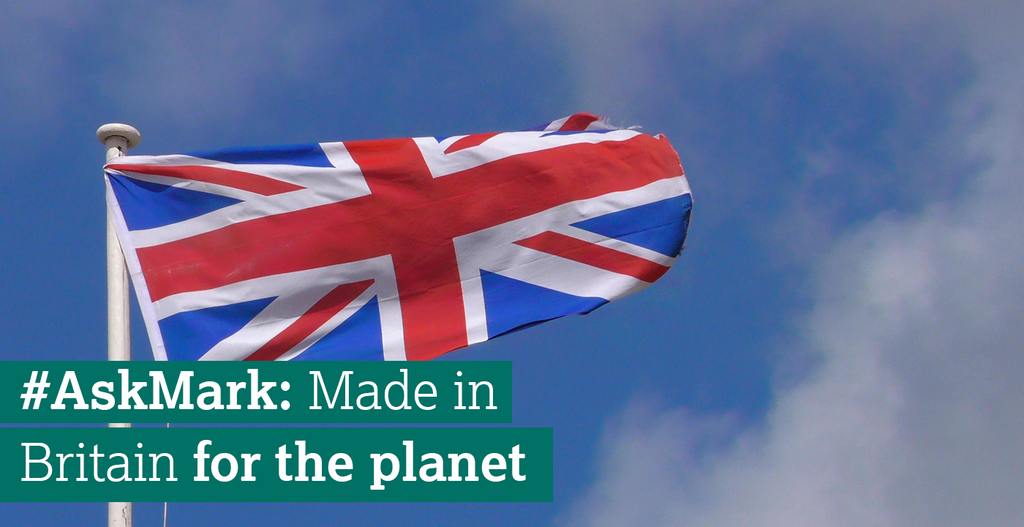#AskMark – Made in Britain for the planet

Summer’s here and the sun is out. Once again, it’s time to dig out my cricket whites and get back to the crease with a bunch of old mates.
While playing ‘dad’s cricket’, a pal of mine – a ship broker by trade – had some grim news that he wanted to share. “Things are going mad in the market and it’s going to be bad for everyone.”
Shipping prices are a pretty good early indicator of inflation and national prosperity, it turns out. And container shipping, especially from Asia, seems to have lost its mind. Where forward rates for ship hire were recently around $8,000 a day, they are now hitting a staggering $146,000. And these are prices that are locked in… for at least five years.
As someone who runs a growing SME, the intricacies of the container market had passed me by. But pandemic imports like PPE and medicines, a growth in online shopping demand and low ship availability have created a perfect storm. Or as my mate said, it means everything imported is going to get way more expensive. “The government should watch out – inflation is coming like a bullet train.”
Of course, inflation is bad for business because it forces up interest rates, hurting investment and hitting jobs. However, that wasn’t the issue that got me thinking.
At Delphis Eco we have been passionately pro-British since the off. Not in a creepy jingoistic way, but more to do with wanting to do the right thing to deliver on our environmental promise. For me, supporting local businesses supports local communities, it also means we can share our eco-vision and standards with suppliers and cut the ‘carbon miles’ of our products.
Sadly, over time Britain has become a manufacturing wasteland. There is no doubt that we have some of the brightest and best minds in this country, yet successive governments have seemingly given up on the idea of supporting companies that make ‘stuff’. The attitude seems to be that third world countries will produce cheap goods and we should just leave them to it, no matter that it means products have to come halfway round the world to us.
Recently there has been plenty of bluster about how the post-pandemic world will be a chance to ‘build back better’. A ‘green revolution’ is going to take place, with Britain at the forefront, apparently.
For our business, the lack of homegrown manufacturing capability has been a real bind. Trying to find a UK firm making lotion pumps and spray triggers for our bottles (we want them made of 100% recycled plastic, of course) has proved totally impossible. Look around your house and you’ll find virtually every one of those trigger sprays on domestic products was made in China.
It’s the same for washing powders. We’d love to get into that market and have a great recipe ready and waiting but I’d have to go to France to get it made (a 30-second phone call would do it), so still our search goes on to find a British partner.
Plastic as a raw material costs the same here as anywhere else in the world, and machine-made mass-produced items have virtually no cost of production. My big gripe is how – as a nation – we’ve got ourselves into such a state. All the small, simple consumables that we import from the Far East could easily be made here if only there was concerted political will to give SMEs a break. As a solution, why not make stuff here and do away with the crazy global supply chains on items that do not require specialist know-how?
Instead, Politicians go for headlines rather than having a joined-up approach. SMB’s make up 99% of UK companies and employ 61% of the workforce, accounting for 52% of the UK’s turnover. They love this kind of stuff and are happy to take risks but unless you are a huge company with a massive lobby budget, you’re invisible to politicians.
For example, on the green front, the recent announcements of Nissan’s decision to base future battery production for new electric models in Sunderland is undoubtably great news. But the 1,600 direct jobs it secures – plus 4,500 more in the firm’s supply chain – is just a drop in the ocean compared to what the wider business community could offer.
From an environmental perspective, people have to see the bigger picture. As a nation we’re signed up to a legal pledge to cut emissions drastically, yet the issue of carbon miles is overlooked and rarely articulated.
Offering SMEs tax incentives to invest in the UK would bring back huge amounts of manufacturing to these shores and create millions of worthwhile jobs, while simultaneously doing away with the need for wasteful, high-emissions imports. I can’t help wonder that if the government gave some kind of incentive to SMEs to invest in machine manufactured goods, we would see a huge lift in locally made products, creating jobs, supporting local communities and cutting C02 units.
It would also spark innovation, meaning businesses like ours could find someone here to make our new washing detergent and triggers for our bottles.
Unfortunately, calls such as this can often be viewed through a distorted Brexit lens. This isn’t about being ‘Little Englanders’, but more about understanding that global commerce in its current form definitely doesn’t work for the planet.

Leave a comment